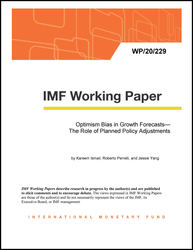
Optimism Bias in Growth Forecasts—The Role of Planned Policy Adjustments
Optimism Bias in Growth Forecasts—The Role of Planned Policy Adjustments
READ MORE...
Volume/Issue:
Volume 2020
Issue 229
Publication date: November 2020
ISBN: 9781513560373
$18.00
Add to Cart by clicking price of the language and format you'd like to purchase
Available Languages and Formats
| English |
Prices in red indicate formats that are not yet available but are forthcoming.
Topics covered in this book
This title contains information about the following subjects.
Click on a subject if you would like to see other titles with the same subjects.
Economics- Macroeconomics , Fiscal adjustment , IMF-supported programs , forecast error , optimism bias , , WP , optimism bias , IMF program document , IMF team , policy adjustment , IMF mission
Summary
Are IMF growth forecasts systematically optimistic? And if so, what is the role of planned policy adjustments on this outcome? Are program forecasts as biased as surveillance forecasts? We try to answer these questions using a comprehensive database on IMF forecasts of economic growth in surveillance and program cases during 2003–2017. We find that large planned fiscal and external adjustments are associated with optimistic growth projections, with significant non-linearities for both program and surveillance cases. Specifically, we find evidence that larger planned fiscal adjustment is associated with higher growth optimism in IMF non-concessional, non-precautionary financial arrangements. Our results show the tendency for optimism has persisted in the period after the Global Financial Crisis. Moreover, the strong correlation between the magnitude of the optimism and expected fiscal consolidation provides a cautionary signal for the post-COVID IMF projections as countries embark on a path of fiscal adjustment.
Copyright © 2010 - 2026
Powered by:
AIDC



